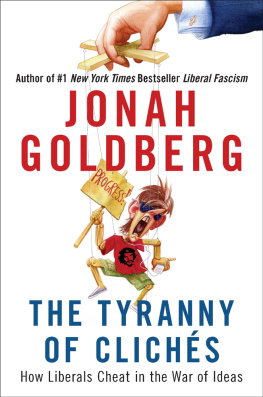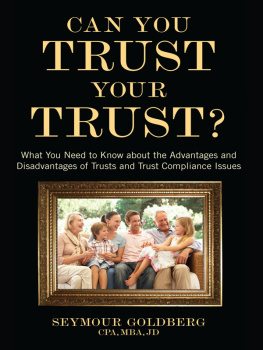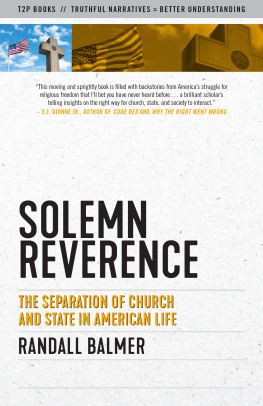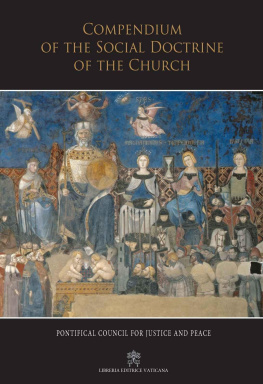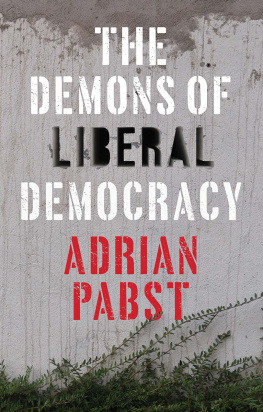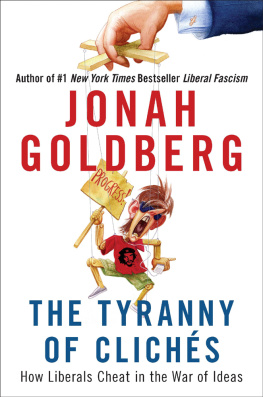The Tyranny of Clichs

The Tyranny of Clichs
How Liberals Cheat in the War of Ideas
JONAH GOLDBERG
Sentinel
SENTINEL
Published by the Penguin Group
Penguin Group (USA) Inc., 375 Hudson Street,
New York, New York 10014, U.S.A.
Penguin Group (Canada), 90 Eglinton Avenue East, Suite 700,
Toronto, Ontario, Canada M4P 2Y3
(a division of Pearson Penguin Canada Inc.)
Penguin Books Ltd, 80 Strand, London WC2R 0RL, England
Penguin Ireland, 25 St. Stephens Green, Dublin 2, Ireland
(a division of Penguin Books Ltd)
Penguin Books Australia Ltd, 250 Camberwell Road, Camberwell,
Victoria 3124, Australia
(a division of Pearson Australia Group Pty Ltd)
Penguin Books India Pvt Ltd, 11 Community Centre, Panchsheel Park,
New Delhi110 017, India
Penguin Group (NZ), 67 Apollo Drive, Rosedale, Auckland 0632,
New Zealand (a division of Pearson New Zealand Ltd)
Penguin Books (South Africa) (Pty) Ltd, 24 Sturdee Avenue,
Rosebank, Johannesburg 2196, South Africa
Penguin Books Ltd, Registered Offices: 80 Strand, London WC2R 0RL, England
First published in 2012 by Sentinel, a member of Penguin Group (USA) Inc.
1 3 5 7 9 10 8 6 4 2
Copyright Jonah Goldberg, 2012
All rights reserved
Library of Congress Cataloging-in-Publication Data
Goldberg, Jonah.
The tyranny of clichs : How liberals cheat in the war of ideas / Jonah Goldberg.
pages cm
Includes bibliographical references and index.
ISBN: 978-1-101-57235-1
1. LiberalismUnited States. 2. ClichsUnited States. I. Title.
JC574.2.U6G64 2012
320.5130973dc23
2012000535
Printed in the United States of America
Set in Bell MT Std
Designed by Spring Hoteling
No part of this book may be reproduced, scanned, or distributed in any printed or electronic form without permission. Please do not participate in or encourage piracy of copyrighted materials in violation of the authors rights. Purchase only authorized editions.
While the author has made every effort to provide accurate telephone numbers and Internet addresses at the time of publication, neither the publisher nor the author assumes any responsibility for errors, or for changes that occur after publication. Further, publisher does not have any control over and does not assume any responsibility for author or third-party Web sites or their content.
ALWAYS LEARNING
PEARSON
To the memory of my big brother, Josh
INTRODUCTION
[W]e have now sunk to a depth at which the restatement of the obvious is the first duty of intelligent men.
G EORGE O RWELL , T HE C OLLECTED E SSAYS , J OURNALISM AND L ETTERS OF G EORGE O RWELL
The Cowardice of Clichs
According to legend, when George Will signed up to become a syndicated columnist in the 1970s, he asked his friend William F. Buckley, Jr.the founder of National Review and a columnist himselfHow will I ever write two columns a week? Buckley responded (Im paraphrasing), Oh it will be easy. At least two things a week will annoy you, and youll write about them.
Buckley was right. Annoyance is an inspiration, aggravation a muse. That which gets your blood up, also gets the inkor these days, pixelsflowing. Show me an author without passion for what he holds to be the truth and I will show you either a boring writer or someone who misses a lot of deadlines, or both. Nothing writes itself, and what gets the writer to push that boulder uphill is more often than not irritation with those saying wrong things righteously.
Which brings me to this book. Theres a kind of argument-that-isnt-an-argument that vexes me. I first started to notice it on university campuses. Ive spoken to a lot of college audiences. Often, I will encounter an earnest student, much more serious looking than the typical hippie with open-toed shoes and a closed mind. During the Q&A session after my speech he will say something like Mr. Goldberg, I may disagree with what you have to say, but I will defend to the death your right to say it.
Then he will sit down, and the audience will applaud. Faculty will nod proudly at this wiser-than-his-years hatchling under their wings. What a glorious moment for everybody. Blessed are the bridge builders.
My response? Who gives a rats ass?
First of all, my right to speak never was in doubt. Indeed, Im usually paid to speak. Besides, Ive given my speech already and were in Q&A time: Shouldnt you have told me this beforehand? Second, the kid is almost surely lying. Hell take a bullet for me? Really?
Clichs like these are a way to earn bravery on the cheap, defending principles you havent thought through or perhaps only vaguely support. Or, heck, maybe he really would leap on a grenade so I could finish talking about how stupid high-speed rail is. But it still doesnt matter, because mouthing these sorts of clichs is away to avoid arguments, not make them. Imagine a defendant is on the stand. The prosecutor peppers the accused murderer with questions: Is this your chain saw? Where were you on the night of the fourteenth? How can you explain the victims foot being in your freezer?
Now imagine the defendant responds, Sir, I may disagree with your line of questioning, but I will defend to the death your right to ask me these things.
The prosecutor, if hes not a complete idiot, will say, Stop trying to change the subject and answer my questions.
One last point about I may disagree with you but Ill defend to the death your right to say it: The implication is not only that the person saying this is brave but also that we live in a society where such bravery might be required. It suggests that speech is so imperiled that bloodshed may be called for. Many people think thats how the phrase was born, that theyre echoing the heroism of some forgotten general or martyr willing to sacrifice himself for the liberty of others. But theyre wrong.
The phrase is usually attributed to Voltaire, though he didnt say it. It was a historians paraphrasing of Voltaires attitude, written more than a century after Voltaires death. And even his attitude wasnt all that sincere. According to S. G. Tallentyres The Friends of Voltaire, the quote traces itself back to a hullaballoo over a book by the French utilitarian philosopher Claude Adrien Helvtius. The book, De lEspirit, argued that people behave the way they do out of a desire to avoid pain or feel pleasure. Or something. Regardless, everyone hated the book, including Voltaire (who took offense at what he considered to be the authors insufficient praise of him). De lEspirit was essentially ignored until the dauphin, the kings son, read it. He really hated it. Parliament ended up banning it. The tome was even publicly burned. Like a 1920s book that could catapult its sales by being Banned in Boston!, De lEspirit became a sensation, translated into every language imaginable, precisely because it had been censored. And, just as suddenly, Helvtius became a celebrity, his salon instantly fashionable.
What the book could never have done for itself, or for its author, persecution did for them both, writes Tallentyre.
The men who had hated it, and had not particularly loved Helvtius, flocked round him now. Voltaire forgave him all injuries, intentional or unintentional. What a fuss about an omelette! [Voltaire] had exclaimed when he heard of the burning. How abominably unjust to persecute a man for such an airy trifle as that! I disapprove of what you say, but I will defend to the death your right to say it, was his attitude now.
Next page
